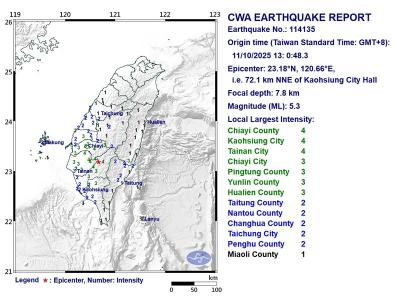Minister of Education Wu Ching-ji (吳清基) expressed support yesterday for the National Science Council’s (NSC) proposal to establish an listening-and-speaking proficiency threshold in English to university entrance requirements.
Wu told reporters on the sidelines of a national conference on nurturing Taiwanese professionals that universities could set their own gate-keeping standards, while students could try to pass the relevant proficiency tests by the time they graduate from high school.
RAISING STANDARDS
Wu said high school students did not care about speaking and listening proficiency because these categories have never been included in the official college entrance examinations, but university candidates should have a certain level of English listening and speaking ability.
The ministry has yet to decide which organization should be put in charge of administering the proficiency tests, Wu said.
NSC SUGGESTION
Wu was responding to a suggestion by National Science Council (NSC) Vice Minister Chang Wen-Chuang (張文昌) to test high school graduates’ proficiency in English listening and speaking in the college entrance examinations.
Chang said Taiwan was failing to produce people who could work anywhere in the world because students did not have enough exposure to different cultures and lacked competence in foreign languages competence, particularly in English.
Some university departments require applicants to have a certain level of English proficiency or an English-language interview.
More than 100 universities require their students to pass the high-intermediate level of the General English Proficiency Test — a proficiency test commissioned developed by the Language Training and Testing Center — before they graduate.
FOREIGN STUDY
In other news, Premier Wu Den-yih (吳敦義) promised yesterday to send 300 outstanding people in different fields to study at top universities or research institutes abroad every year. He said people selected for the program would receive a yearly stipend of between NT$1 million (US$31,000) and NT$1.5 million.
The government should also invite renown international experts, academics and Nobel Prize laureates to teach or conduct research in Taiwan for at least one year to “promote academic research and inspire Taiwanese students,” the premier said.
FOREIGN TEACHERS
The ministry also plans to recruit outstanding foreign teachers to teach at universities by offering them a pay scale that was “as handsome as possible.”
Wu Ching-chi said local universities had been unable to compete with their counterparts in China or Hong Kong because they did not have enough distinguished foreign professors.
“We are willing to pay as much as we can as long as we can recruit good talent,” he said.

The Central Weather Administration (CWA) today issued a sea warning for Typhoon Fung-wong effective from 5:30pm, while local governments canceled school and work for tomorrow. A land warning is expected to be issued tomorrow morning before it is expected to make landfall on Wednesday, the agency said. Taoyuan, and well as Yilan, Hualien and Penghu counties canceled work and school for tomorrow, as well as mountainous district of Taipei and New Taipei City. For updated information on closures, please visit the Directorate-General of Personnel Administration Web site. As of 5pm today, Fung-wong was about 490km south-southwest of Oluanpi (鵝鑾鼻), Taiwan's southernmost point.

Almost a quarter of volunteer soldiers who signed up from 2021 to last year have sought early discharge, the Legislative Yuan’s Budget Center said in a report. The report said that 12,884 of 52,674 people who volunteered in the period had sought an early exit from the military, returning NT$895.96 million (US$28.86 million) to the government. In 2021, there was a 105.34 percent rise in the volunteer recruitment rate, but the number has steadily declined since then, missing recruitment targets, the Chinese-language United Daily News said, citing the report. In 2021, only 521 volunteers dropped out of the military, the report said, citing

A magnitude 5.3 earthquake struck Kaohsiung at 1pm today, the Central Weather Administration said. The epicenter was in Jiasian District (甲仙), 72.1km north-northeast of Kaohsiung City Hall, at a depth of 7.8km, agency data showed. There were no immediate reports of damage. The earthquake's intensity, which gauges the actual effects of a temblor, was highest in Kaohsiung and Tainan, where it measured a 4 on Taiwan's seven-tier intensity scale. It also measured a 3 in parts of Chiayi City, as well as Pingtung, Yunlin and Hualien counties, data showed.

Nearly 5 million people have signed up to receive the government’s NT$10,000 (US$322) universal cash handout since registration opened on Wednesday last week, with deposits expected to begin tomorrow, the Ministry of Finance said yesterday. After a staggered sign-up last week — based on the final digit of the applicant’s national ID or Alien Resident Certificate number — online registration is open to all eligible Taiwanese nationals, foreign permanent residents and spouses of Taiwanese nationals. Banks are expected to start issuing deposits from 6pm today, the ministry said. Those who completed registration by yesterday are expected to receive their NT$10,000 tomorrow, National Treasury